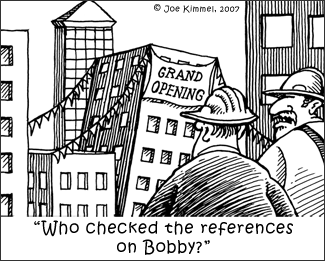
If you’re looking for help from an engineer or engineering team, the marketplace looks rich with candidates. Discerning the differences between candidates, however, can be very difficult if you don’t have the technical background to properly interview for the level of expertise and competency that your project requires. This series of posts will offer information helpful to selecting the right engineering consultants for a particular task. This post will focus on understanding the different skill levels, experience, and qualifications of individuals and firms offering technical skills for hire.
 We believe that the more you can discern among the varied experience and skill levels in the marketplace, the better able you are to shift from focusing on dollars-per-hour to results-per-dollar.
We believe that the more you can discern among the varied experience and skill levels in the marketplace, the better able you are to shift from focusing on dollars-per-hour to results-per-dollar.
To begin, although the right to use the term “engineer” is heavily regulated by the Texas Board of Professional Engineers, it is poorly policed. (For the purposes of this blog series, the referenced rules and regulations will apply to the state of Texas. While the rules from state to state may vary, in general, similar rules are adopted and enforced by most states with respect to engineering licensure.) In the next post I will examine many of the board rules that regulate who can call themselves an engineer, as well as the criteria for offering services for hire to the public. For illustration, I will break down technical consultants into several groups:
- Non-engineers
- Degreed-but-not-licensed-engineers
- Jacks-of-all-trades
- Unlicensed Engineering Firms
- Licensed Engineers
- Licensed Engineering Firms
Non-Engineers
This category encompasses a large diversity of skill sets bounded only by one criteria: these individuals have not received an ABET accredited engineering degree. Non-Engineers may have a degree from a school of technology, may have received extensive on-the-job training, or have had other opportunities to become highly skilled within their field. Conversely, the market is also diluted with many who are self-taught tinkerers, who despite significant interest in the field, have had little exposure or formal instruction in the underlying theory, industry standards, and best practices of engineering.
Degreed-but-not-Licensed-Engineers
This category includes anyone who has received an ABET accredited engineering degree, but has not gone through the process of becoming a licensed engineer. In many scenarios, this group can pursue a successful lifelong career in engineering under a company’s employ without ever being held back by the lack of a license. The work experience of Degreed-but-not-Licensed-Engineers may vary greatly, as some in this category may be newly graduated with little to no experience, others may have decades of experience, and still others may have spent much of their careers post-graduation in non-design oriented capacities.
Jacks-of-all-trades
This category is made up of individuals from the first two categories above, but fit the additional qualification that they claim expertise in a myriad of skill sets. For example, a sole proprietor consultant may: design, lay out, and assemble circuit boards, test and write firmware for circuit boards, develop desktop and web applications, perform 2D and 3D drafting and mechanical design, rapid 3D prototyping, etc. It is often the case, however, that breadth of skills comes at the expense of depth of expertise in any area. The Jacks-of-all-trades tend to be highly motivated and feel a sense of ownership of all aspects of a problem, but they may opt for poorer implementations than a designer with deeper and more specific expertise would pursue.
Unlicensed-Engineering-Firms
In contrast to the sole-proprietors described above, this category is comprised of groups of unlicensed individuals teaming together to offer an expanded array of services beyond what a single engineer could provide. These entities are sometimes well established, with years of work history and big name clients, despite having no licensed engineers on staff.
If you’ve followed along to this point, you’ve hopefully gathered that the individuals above possess valuable skills, and I don’t intend to disparage or discount their capabilities. However, a poorly understood fact is this:
It is a Class A Misdemeanor for anyone who is not a licensed professional engineer to offer their engineering service to the public unless operating under the supervision of a licensed engineer. It is against the law for any of these unlicensed groups to be operating as consulting engineers – and for good reasons.
(TBPE Regulation 1001.552 – Board Rules)
The Texas Board of Professional Engineers (TBPE) regulates the practice of engineering in an effort to protect the public by enforcing standards of ethics, competency, and continuing education. Any engineer with a license has had to pass rigorous examinations verifying their expertise, as well as demonstrate multiple years of appropriate expertise. The engineer must have recommendations from other licensed engineers verifying their work history and competence, and must complete at least fifteen hours of continuing education each year in order to maintain a license.
Professions that serve the public, such as health care professionals, plumbers, electricians, cosmetologists, lawyers, accountants, even nail technicians, all have licensing requirements to guarantee the public that the service providers have met safety and competency requirements. At Sparx, we regularly encounter clients who have already spent tens or hundreds of thousands of dollars with unlicensed firms or individuals before coming to us.

Knowing the engineer or firm has been vetted by the Texas Board of Professional Engineers can offer a great deal of security to what is often a large financial investment.
A qualified engineer can obtain and maintain a license for less than $500 per year. If your engineering team is operating illegally, you should ask them why. You can verify if an engineer or firm is licensed in Texas here: http://engineers.texas.gov/search.php
